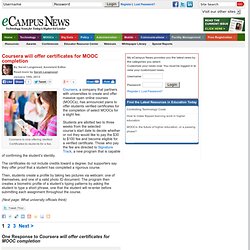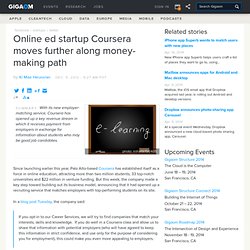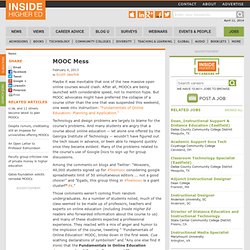

Coursera will offer certificates for MOOC completion. By Sarah Langmead, Assistant Editor Read more by Sarah Langmead January 10th, 2013 Coursera is now offering Verified Certificates to students for a fee.

Coursera, a company that partners with universities to create and offer massive open online courses (MOOCs), has announced plans to offer students verified certificates for the completion of select MOOCs for a slight fee. Students are allotted two to three weeks from the selected course’s start date to decide whether or not they would like to pay the $30 to $100 fee and become eligible for a verified certificate. Those who pay the fee are directed to Signature Track, a new program that is capable of confirming the student’s identity. The certificates do not include credits toward a degree, but supporters say they offer proof that a student has completed a rigorous course.
Then, students create a profile by taking two pictures via webcam: one of themselves, and one of a valid photo ID document. (Next page: What university officials think) Coursera doubles university partnerships. Coursera continued its ambitious expansion in the growing market for MOOC support today, announcing accords with 16 new universities to help them produce massive open online courses — more than doubling the company’s number of institutional partners and pushing its course count near 200.

The new partners include the first liberal arts college, Wesleyan University, to leap formally into the MOOC game, as well as the first music school, the Berklee College of Music. Coursera also announced deals with name-brand private universities, such as Brown, Columbia, Emory and Vanderbilt Universities; some major state institutions, such as the University of Maryland System, the Ohio State University and the Universities of Florida, and California at Irvine; and several international universities, such as the Hebrew University of Jerusalem, Hong Kong University of Science and Technology, and the Universities of British Columbia, London, and Melbourne. Online ed startup Coursera moves further along money-making path. Since launching earlier this year, Palo Alto-based Coursera has established itself as a force in online education, attracting more than two million students, 33 top-notch universities and $22 million in venture funding.

But this week, the company made a key step toward building out its business model, announcing that it had opened up a recruiting service that matches employers with top-performing students on its site. In a blog post Tuesday, the company said: If you opt-in to our Career Services, we will try to find companies that match your interests, skills and knowledge. If you do well in a Coursera class and allow us to share that information with potential employers (who will have agreed to keep this information in strict confidence, and use only for the purpose of considering you for employment), this could make you even more appealing to employers. Online classes: Coursera to offer college credit for some courses starting in 2013. Photo by James Duncan Davidson.

Coursera, potentially the most disruptive startup that American higher education has ever seen, has rocketed to prominence with a model that seems almost too good to be true. It offers in-depth online classes from some of the world's top professors and universities for free. Until now, the only catch has been that you can't get college credit for taking them. The most you can get is a certificate of completion. Now the one-year-old company, founded by Stanford professors Daphne Koller and Andrew Ng, is taking the next step.
The courses will be evaluated for credit by the ACE College Credit Recommendation Service, or ACE CREDIT. Coursera Takes A Big Step Toward Monetization, Now Lets Students Earn “Verified Certificates” For A Fee. Stanford professors Daphne Koller and Andrew Ng launched Coursera last year to give anyone and everyone access to courses from top-tier universities — for free, online.

At launch, the startup offered courses from a mere three institutions, but today, things have changed, as Coursera’s platform now hosts over 200 courses from 33 top international and domestic schools and reaches over 2 million students around the globe. It has the makings of a transformational concept, offering content only from the most reputed departments, professors and universities, bringing that experience online and giving the key to the masses. Yet, in spite of a mission that’s easy to get behind, Coursera hasn’t been without its detractors. While massive open online courses (a.k.a. The other issue: Beyond the fact that Coursera has raised $22 million in venture capital (the same is true of Udacity), MOOC platforms haven’t yet been able to create substantive business models.
Coursera forced to call off a MOOC amid complaints about the course. Maybe it was inevitable that one of the new massive open online courses would crash.

After all, MOOCs are being launched with considerable speed, not to mention hype. But MOOC advocates might have preferred the collapse of a course other than the one that was suspended this weekend, one week into instruction: "Fundamentals of Online Education: Planning and Application. " Technology and design problems are largely to blame for the course's problems. And many students are angry that a course about online education -- let alone one offered by the Georgia Institute of Technology -- wouldn't have figured out the tech issues in advance, or been able to respond quickly once they became evident. Many of the problems related to the course's use of Google Docs to sign up for group discussions.